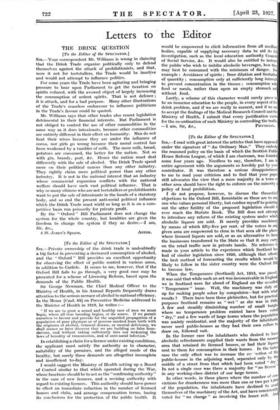Letters to the Editor
THE DRINK QUESTION
[To the Editor of the SPECTATOR.] Slit,—Your correspondent Mr. Williams is wrong in claiming that the Drink Trade organize politically only to defend themselves against the attack of prohibitionists, and that, were it not for teetotallers, the Trade would be inactive and would not attempt to influence politics.
For some years the Trade have been agitating and bringing pressure to bear upon Parliament to get the taxation on spirits reduced, with the avowed object of largely increasing the consumption of ardent spirits. That is not defence ; it is attack, and for a bad purpose. Many other illustrations of the Trade's ceaseless endeavour to influence politicians in the Trade's favour could be quoted.
Mr. Williams says that other trades also resent legislation detrimental to their financial interests. But Parliament is not obliged to control the use of other commodities in the same way as it does intoxicants, because other commodities are entirely different in their effect on humanity. Men do not beat their wives because they are under the influence of cocoa, nor girls go wrong because their moral control has been weakened by a tumbler of milk. The more milk, bread, potatoes are consumed, the better for the nation. Not so with gin, brandy, port, &c. Hence the nation must deal differently with the sale of alcohol. The Drink Trade spend more on their political caucus than any other industry. They rightly claim more political power than any other industry. It is not in the national interest that an industry whose commercial expansion conflicts with the national welfare should have such vast political influence. That is why so many citizens who are not teetotallers or prohibitionists want to put the sale of intoxicants in the hands of a statutory body, and so end the present anti-social political influence which the Drink Trade must wield so long as it is on a com- petitive basis run primarily for private profit.
By the " Oxford " Bill Parliament does not change the system for the whole country, but localities are given the freedom to change the system if they so desire.—I am, Sir, &c.,










































 Previous page
Previous page